Related Research Articles
The Chinese room argument holds that a computer executing a program cannot have a mind, understanding, or consciousness, regardless of how intelligently or human-like the program may make the computer behave. The argument was presented in a 1980 paper by the philosopher John Searle entitled "Minds, Brains, and Programs" and published in the journal Behavioral and Brain Sciences. Before Searle, similar arguments had been presented by figures including Gottfried Wilhelm Leibniz (1714), Anatoly Dneprov (1961), Lawrence Davis (1974) and Ned Block (1978). Searle's version has been widely discussed in the years since. The centerpiece of Searle's argument is a thought experiment known as the Chinese room.

Diana Wynne Jones was a British novelist, poet, academic, literary critic, and short story writer. She principally wrote fantasy and speculative fiction novels for children and young adults. Although usually described as fantasy, some of her work also incorporates science fiction themes and elements of realism. Jones's work often explores themes of time travel and parallel or multiple universes. Some of her better-known works are the Chrestomanci series, the Dalemark series, the three Moving Castle novels, Dark Lord of Derkholm, and The Tough Guide to Fantasyland.
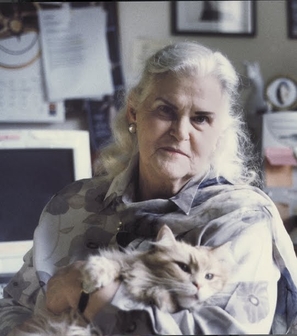
Anne Inez McCaffrey was an American writer known for the Dragonriders of Pern science fiction series. She was the first woman to win a Hugo Award for fiction and the first to win a Nebula Award. Her 1978 novel The White Dragon became one of the first science-fiction books to appear on the New York Times Best Seller list.

The IBM 704 is the model name of a large digital mainframe computer introduced by IBM in 1954. Designed by John Backus and Gene Amdahl, it was the first mass-produced computer with hardware for floating-point arithmetic. The IBM 704 Manual of operation states:
The type 704 Electronic Data-Processing Machine is a large-scale, high-speed electronic calculator controlled by an internally stored program of the single address type.
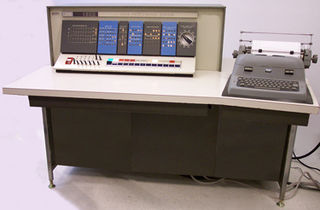
The IBM 1620 was a model of scientific minicomputer produced by IBM. It was announced on October 21, 1959, and was then marketed as an inexpensive scientific computer. After a total production of about two thousand machines, it was withdrawn on November 19, 1970. Modified versions of the 1620 were used as the CPU of the IBM 1710 and IBM 1720 Industrial Process Control Systems.

The IBM 700/7000 series is a series of large-scale (mainframe) computer systems that were made by IBM through the 1950s and early 1960s. The series includes several different, incompatible processor architectures. The 700s use vacuum-tube logic and were made obsolete by the introduction of the transistorized 7000s. The 7000s, in turn, were eventually replaced with System/360, which was announced in 1964. However the 360/65, the first 360 powerful enough to replace 7000s, did not become available until November 1965. Early problems with OS/360 and the high cost of converting software kept many 7000s in service for years afterward.
Damien Francis Broderick is an Australian science fiction and popular science writer and editor of some 74 books. His science fiction novel The Dreaming Dragons (1980) introduced the trope of the generation time machine, his The Judas Mandala (1982) contains the first appearance of the term "virtual reality" in science fiction, and his 1997 popular science book The Spike was the first to investigate the technological singularity in detail.

Kate Wilhelm was an American author. She wrote novels and stories in the science fiction, mystery, and suspense genres, including the Hugo Award–winning Where Late the Sweet Birds Sang. Wilhelm established the Clarion Workshop along with her husband Damon Knight and writer Robin Scott Wilson.

Science Fantasy, which also appeared under the titles Impulse and SF Impulse, was a British fantasy and science fiction magazine, launched in 1950 by Nova Publications as a companion to Nova's New Worlds. Walter Gillings was editor for the first two issues, and was then replaced by John Carnell, the editor of New Worlds, as a cost-saving measure. Carnell edited both magazines until Nova went out of business in early 1964. The titles were acquired by Roberts & Vinter, who hired Kyril Bonfiglioli to edit Science Fantasy; Bonfiglioli changed the title to Impulse in early 1966, but the new title led to confusion with the distributors and sales fell, though the magazine remained profitable. The title was changed again to SF Impulse for the last few issues. Science Fantasy ceased publication the following year, when Roberts & Vinter came under financial pressure after their printer went bankrupt.
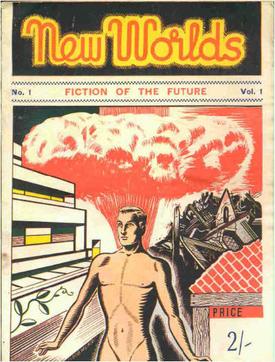
New Worlds was a British science fiction magazine that began in 1936 as a fanzine called Novae Terrae. John Carnell, who became Novae Terrae's editor in 1939, renamed it New Worlds that year. He was instrumental in turning it into a professional publication in 1946 and was the first editor of the new incarnation. It became the leading UK science fiction magazine; the period to 1960 has been described by science fiction historian Mike Ashley as the magazine's "Golden Age".
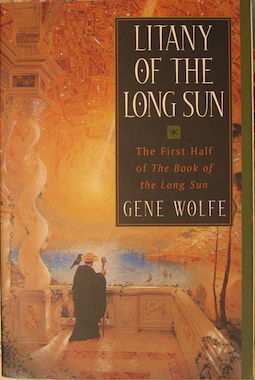
The Book of the Long Sun (1993–1996) is a series of four science fantasy novels or one four-volume novel by the American author Gene Wolfe. It is set in the same universe as The Book of the New Sun series that Wolfe inaugurated in 1980, and the Internet Science Fiction Database catalogs them both as sub-series of the "Solar Cycle", along with other writings.
The philosophy of artificial intelligence is a branch of the philosophy of mind and the philosophy of computer science that explores artificial intelligence and its implications for knowledge and understanding of intelligence, ethics, consciousness, epistemology, and free will. Furthermore, the technology is concerned with the creation of artificial animals or artificial people so the discipline is of considerable interest to philosophers. These factors contributed to the emergence of the philosophy of artificial intelligence.

The Ship Who Sang (1969) is a science fiction novel by American writer Anne McCaffrey, a fix-up of five stories published 1961 to 1969. It is also the title of the 1961 novelette which is the first of these stories. The series started by the book, the "Brain & Brawn Ship series", is sometimes called the "Ship Who Sang series".

Terence William (Terry) Dowling, is an Australian writer and journalist.
"Mimsy Were the Borogoves" is a science fiction short story by Lewis Padgett, originally published in the February 1943 issue of Astounding Science Fiction Magazine. It was judged by the Science Fiction Writers of America to be among the best science fiction stories written prior to 1965 and included in the anthology The Science Fiction Hall of Fame, Volume One, 1929–1964. In 2007, it was loosely adapted into a feature-length film titled The Last Mimzy. The title of the original short story quotes a verse from "Jabberwocky", a poem found in the novel Through the Looking-Glass by author Lewis Carroll.
This article presents a list of the historical events and publications of Australian literature during 2006.
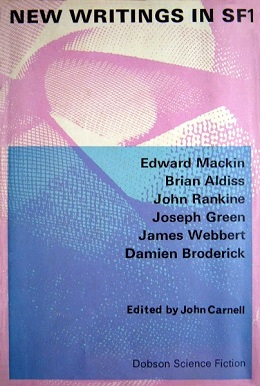
New Writings in SF was a series of thirty British science fiction original anthologies published from 1964 to 1977 under the successive editorships of John Carnell from 1964 to 1972 and Kenneth Bulmer from 1973 to 1977. There were in addition four special volumes compiling material from the regular volumes. The series showcased the work of mostly British and Commonwealth science fiction authors, and "provided a forum for a generation of newer authors."
Edward Mackin was a British writer of science fiction from Liverpool, England. He was best known for his series of stories about 21st-century cyberneticist Hek Belov, published in various magazines, including Science Fantasy and New Worlds between 1957 and 1966. One history of science fiction magazines mentions him as one of John Carnell's 'stalwarts'; his story 'Key to Chaos' was published in Carnell's anthology of original stories New Writings in SF 1. He is credited with one of the earliest, most prescient fictional descriptions of factory farming.
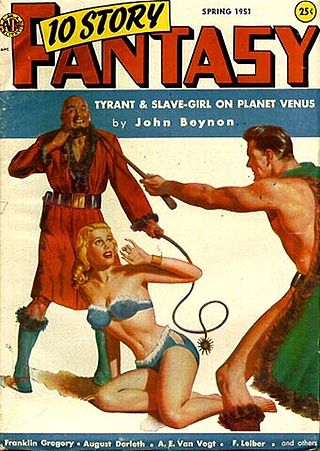
10 Story Fantasy was a science fiction and fantasy pulp magazine which was launched in 1951. The market for pulp magazines was already declining by that time, and the magazine only lasted a single issue. The stories were of generally good quality, and included work by many well-known writers, such as John Wyndham, A.E. van Vogt and Fritz Leiber. The most famous story it published was Arthur C. Clarke's "Sentinel from Eternity", which later became part of the basis of the movie 2001: A Space Odyssey.
Sarah Pinsker is an American science fiction and fantasy author. She is a nine-time finalist for the Nebula Award, and her debut novel A Song for a New Day won the 2019 Nebula for Best Novel while her story "Our Lady of the Open Road won the 2016 Nebula Award for Best Novelette. Her novelette "Two Truths and a Lie" received both the Nebula Award and the Hugo Award. Her fiction has also won the Philip K. Dick Award, the Theodore Sturgeon Award and been a finalist for the Hugo, World Fantasy, and Tiptree Awards.
References
- ↑ ISFDB author bibliography
- ↑ ISFDB publication history
- ↑ "The Reference Library", Analog , October 1966, p.163
- ↑ "The Reference Library", Astounding Science Fiction , September 1953, p.144
- ↑ Building New Worlds. 1946-1959: The Carnell Era, Volume One, Wildside Press, pp. 82-83